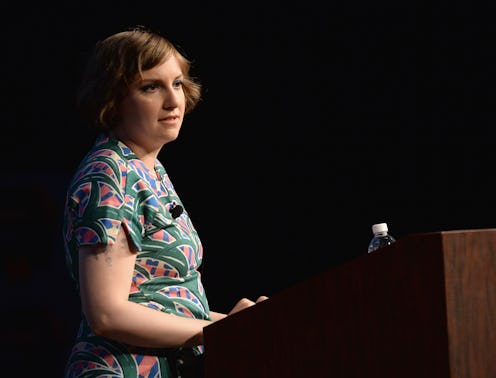Entertainment
How Much Responsibility Does Dunham Really Have?
Lena Dunham has been even more everywhere lately than usual, what with the release of her book Not That Kind of Girl. In a new PBS special, Makers: Women in Hollywood, airing on Oct. 7, Dunham discusses her discomfort with being held accountable for representing womanhood as a monolith, especially in regards to sex: "I resent being forced into a position of having to represent all of female sexuality."
Dunham discusses in the interview her creative process at the inception of the show, saying that initially she had approached it naively: "I didn't know if I would get away with some of the sexual content, I didn't know what was allowed. I went into it thinking that everything was allowed." Dunham has always been open and honest about her sexual experiences, and Girls explores sexual relationships in a way that other shows are perhaps afraid to do.
Girls has been scrutinized often for what some critics describe as unnecessary sexual content."In the Makers interview it's explained, "[They] objected to her frequent nudity and the empty sexual behavior of her characters." I think that's an unfair judgment — Girls does seek to reinvent the way that young women in the aughts approach sexual relationships as flush with the rest of their lives, struggling both with relationships as well as with identity and careers. For that, I do commend Dunham. But I don't think that she holds as much responsibility as she believes she does.
When Girls premiered, Dunham was widely praised by television critics and media outlets alike, hailing her with the generous moniker of the "voice of a generation." Backlash ensued, primarily from women of color, who resented being "represented" by Dunham, especially in the wake of the overwhelming whiteness of Dunham's show. In addressing the problematic absence of people of color on her show, Dunham said in an interview on NPR that it was all but intentional:
This show isn't supposed to feel exclusionary. It's supposed to feel honest, and it's supposed to feel true to many aspects of my experience... I wanted to avoid was tokenism in casting. If I had one of the four girls, if, for example, she was African-American, I feel like — not that the experience of an African-American girl and a white girl are drastically different, but there has to be specificity to that experience [that] I wasn't able to speak to.
It's a wide-eyed response. Dunham cannot, in fact, speak to the experience of women of color, but she could have hired a woman of color writer on her staff to provide that background. Regardless, I think in the Makers interview her comment about being held responsible only addresses half the issue. I do think the media expects a ridiculous amount from her, as if she is the only woman creating on television — in that regard, it's unfair. And Dunham is right; she should not be held accountable for being a conscious role model, as men on television are not held to the same standards. The 28-year old recently discussed on The Daily Show how she has learned to respond to criticism, "with class and a little bit of sass," which I think is a positive, appropriate response, but at the same time, dismissive. She does not at all discuss what kind of self-reflection the criticism she receives may incite — perhaps she mentions this in her book.
She's had more opportunity to create than, perhaps, the women of color who call her out on her lack of representation, and in that vein, maybe she does hold a certain responsibility to use the space she has to offer more diverse experience. On the other hand, it is HER art, and if she feels that it should be exclusively authentic to her personal experiences, that is her prerogative. I do agree with her that there is enormous pressure upon her to deliver, and that's unfair and unnecessary. I just wish she would more often discuss and engage with her critics rather than just sass them.
You can watch the excerpt of Dunham's Makers interview here.
Images: Getty Images
